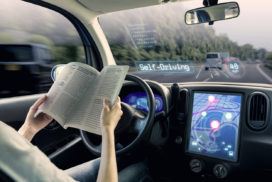Driverless cars have been promoted in the media for their ability to put an end to human-caused car accidents and for their ability to make profits for taxi and ride-sharing services, and for the sheer “wow” factor of the technological advancement. While there have been some concerns about the safety of these vehicles—especially after the recent deadly accident in Arizona involving a pedestrian—both companies, cities, and even government officials are pushing for a future where driverless cars will be common on the road.
One group of individuals who are looking forward to a driverless future are disability rights advocates. According to a writer for the New York Times, many Americans with disabilities struggle to find reliable means of transportation. Many cannot afford cars with required adaptations. However driverless cars can change all that.
Persons with disabilities like blindness or paralysis would be able to purchase driverless cars that wouldn’t need exorbitantly expensive adaptations. One wheelchair user noted that he spent $25,000 above his car’s list cost for additional features that make his car drivable. Yet, disability advocates also note that while driverless cars will make it more accessible for people with disabilities to access the open road, many of the prototype vehicles don’t come with accessible features built in.
Some disability advocates say that the auto industry should put more money into designing vehicles that will be accessible by all. Currently, the new vehicles appear to resemble any other vehicle on the market, along with these vehicle’s limitations for persons with disabilities.
Self-driving cars are still years away from being seen on roads across America. This complex technology is still very much in the testing phase. According to CNN, it is likely that more self-driving car accidents will occur before the cars are available to the general public. While critics of the technology claim that driverless cars shouldn’t be allowed on the road until they are deemed absolutely safe, supporters of fast-tracking the technology believe that we need to test the cars in real-world scenarios to make the artificial intelligence more robust.
As more of these cars get tested on major cities, there will likely be cases that arise based on who is negligent behind the wheel. Is it the safety driver in the vehicle? Is it the company doing the testing? Or could it be the city, responsible for designing the roads. All of these factors play a role in accidents and in safety. At the end of the day, the law will likely evolve and become clearer as these cars are found more often on the road.
Until then, everyone behind the wheel has a responsibility to drive safely. If you or a loved one was hurt in a car accident in Dallas, Texas, consider reaching out to the Law Offices of Robert Gregg today. Our car accident attorneys may be able to help you seek damages for your medical costs, lost wages, and pain and suffering.


